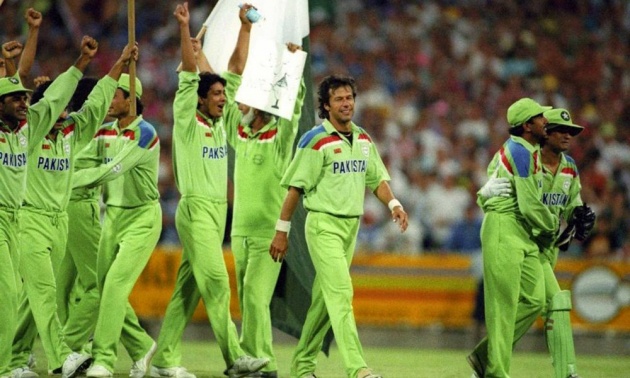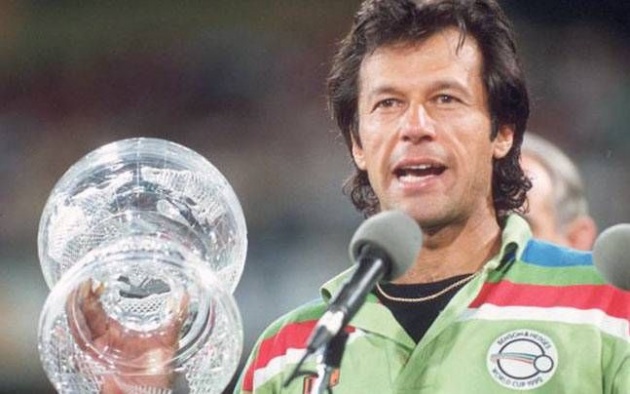
Full name: Imran Khan NiaziDate of Born: November 25, 1952, Lahore, PunjabMajor teams: Pakistan, Dawood Club, Lahore,New South Wales, Oxford University,Pakistan
International Airlines, Sussex, WorcestershireBatting style: Right-hand batBowling style: Right-arm fast
Imran Khan is best known in Britain as a cricketer, playboy and one-time husband of Jemima (née Goldsmith). But he has also been phenomenally successful at raising funds for health and educational projects, and equally unsuccessful, as founder of a political party, at winning seats in the National Assembly. His autobiography fills out this partial picture.
The book takes the form of a spiritual journey. The young man, one of cricket’s greatest all-rounders, considered himself invincible; there was nothing that an outstanding talent, hard work and belief in himself could not achieve. Western-educated at Aitchison College, the English-medium public school in Lahore, followed by the Royal Grammar School in Worcester and Keble College, Oxford, he confined religious practice to visits to the mosque.
Then came a stress fracture that put him out of cricket for more than two years and the death of his mother from cancer. These blows dented his feeling of self-sufficiency and led to the discovery of the richness of Islam.
In this he was guided by the writings of Iqbal, the poet-philosopher who is honoured as the spiritual founder of Pakistan, and by Mian Bashir, a retired civil servant and devout Muslim. His faith was also deepened through action – the immense task of raising money for a cancer hospital in honour of his mother.
The building alone cost $22 million. Then more money had to be found to offer free treatment to those who could not afford to pay. The challenge persuaded Khan to continue playing cricket for his country for longer than he would have liked; the hospital board members felt that otherwise fund-raising would suffer. His sporting career climaxed in winning the World Cup in 1992, at the age of 39, playing with a ruptured shoulder cartilage.
If the loss of East Pakistan in 1971 was the lowest point in the country’s fortunes, victory over England in the final was, in Khan’s view, the highest.“My faith and the hospital grew together,” he writes. “The hospital tested my belief in God to the limit and all the time kept strengthening it.” The experience also opened his eyes to the generosity of poor Pakistanis and the rottenness of their rulers.
The next step in his journey was to found a political party, Tehreek-e-Insaf (Movement for Justice), and contest parliamentary elections.
Fully entering the political fray put great strains on his marriage to Jemima. The election campaigns of 1997 and 2002 meant he was often away from home. His opponents attacked him through her and it was even suggested, her father being Jewish, that Tehreek-e-Insaf was part of a Zionist plot to take over Pakistan.
Not only did the marriage fold but the political rewards were minimal: not a single seat in 1997, one seat, won by him, in 2002 and held until he resigned in protest at General Pervez Musharraf’s decision to run for the presidency while remaining head of the army.
Not beholden to any particular group, Khan lays about him at length and at will. The military’s power is disproportionate. Democracy is “just a cover” for the Pakistan People’s Party and the Pakistan Muslim League to “take turns in plundering our country”. The religious parties are full of “bigots completely lacking in compassion and tolerance”.
Freedom of the press is a myth, and the police and lower judiciary are hopelessly corrupt. Above all, following 9/11 and the invasion of Afghanistan, the country has sacrificed its sovereignty to American needs, illustrated recently by the killing of Osama bin Laden on Pakistani soil.
The Nato-led alliance should withdraw immediately from Afghanistan and leave the regional powers to sort out the mess. Aid from Washington and the International Monetary Fund fuels corruption and should be stopped.
And the agent of change? Khan sees the death of bin Laden in May as a turning-point. Utterly humiliated, the country is looking for a radical alternative and Tehreek-e-Insaf is the only party that can offer it. Given the forces ranged against him, there is something both admirable and quixotic about his self-confidence.
.In a nutshell Imran Khan is indisputably the greatest cricketer to emerge from Pakistan, and arguably the world's second-best allrounder after Garry Sobers. He took a mediocre side and transformed them into world-beaters, leading them to the World Cup title in 1992.
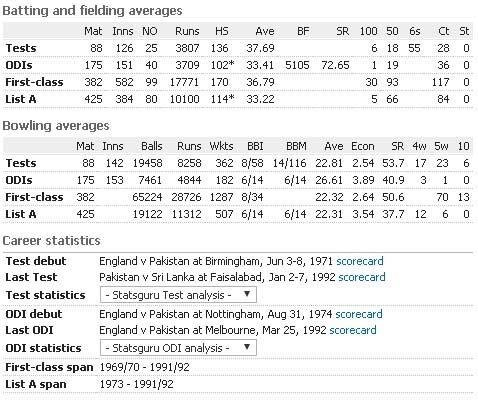 Imran Khan treated Ravi Shastri like a street bowler. GOD OF CRICKET = IMRAN
Imran Khan treated Ravi Shastri like a street bowler. GOD OF CRICKET = IMRAN
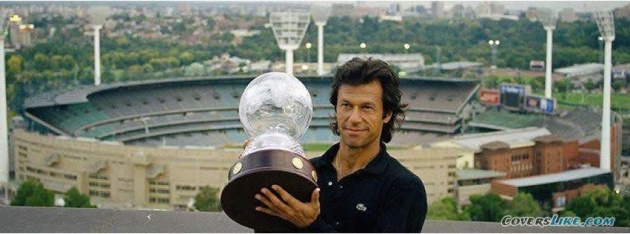 Profile
Profile
Few would dispute that Imran was the finest cricketer Pakistan has produced, or the biggest heartthrob. Suave, erudite and monstrously talented, he gave cricket in the subcontinent real sex appeal in the 1970s and 1980s. As such he and TV completed the popularisation of the game in his country which Hanif Mohammad and the radio had begun. Thousands, if not millions, who had never dreamt of bowling fast on heartless baked mud suddenly wanted to emulate Imran and his lithe bounding run, his leap and his reverse-swinging yorker. He also made himself into an allrounder worth a place for his batting alone, and captained Pakistan as well as anyone, rounding off his career with the 1992 World Cup. He played hardly any domestic cricket in Pakistan: instead he just flew in for home series from Worcestershire or Sussex, or rather from the more fashionable London salons. His averages (37 with the bat, 22 with the ball) put him at the top of the quartet of allrounders (Ian Botham, Richard Hadlee and Kapil Dev being the others) who dominated Test cricket in the 1980s. And whereas Botham declined steadily, Imran just got better and better: in his last 10 years of international cricket he played 51 Tests, averaging a sensational 50 with the bat and 19 with the ball. He gave no quarter during some memorable battles with West Indies - Pakistan drew three series with them at a time when everybody else was being bounced out of sight - and he led Pakistan to their first series victory in England in 1987, taking 10 for 77 with an imperious display in the decisive victory at Headingley. After retirement he remained a high-profile figure, with his marriage - and subsequent split with - the socialite Jemima Goldsmith and a move into the labyrinthine world of Pakistan politics.
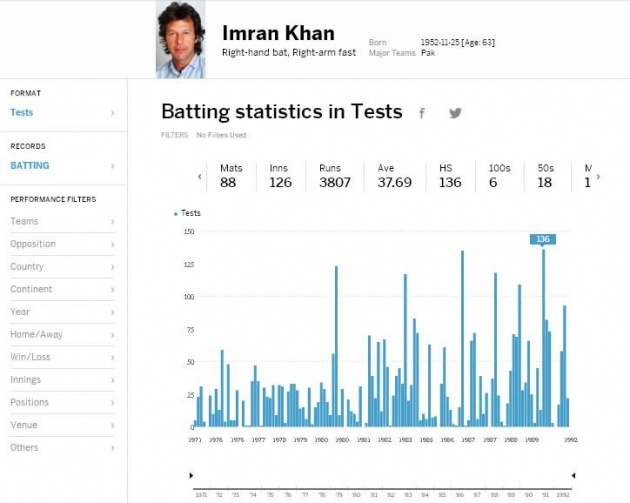 Imran Khan became an inspiration to youngsters for venturing into cricket on an international level. He rose to popularity with his amazing talent as one of the finest cricketers Pakistan has ever produced. His journey of transforming from the biggest heartthrob of cricket to an influential politician is highly impressive and motivating. He is credited for leading Pakistan to its first ever Cricket World Cup title in 1992, defeating England, thereby being termed as the most successful and prominent cricket captain of Pakistan. This champion cricketer surprised the world as an exceptional fast bowler and a great all-rounder, thus giving cricket an all-new form in the country. He excelled not just in the cricketing arena, but also in the political world and social ground. He retired from cricket in 1992 and entered politics by forming his own party – Pakistan Tehreek-e-Insaf (Movement for Justice). He established the first cancer hospital, in Lahore, after losing his mother to the deadly disease, treating the poor for free. He is involved in raising funds for various health and educational projects, coming out a helping hand for the underprivileged and deserving.
Imran Khan became an inspiration to youngsters for venturing into cricket on an international level. He rose to popularity with his amazing talent as one of the finest cricketers Pakistan has ever produced. His journey of transforming from the biggest heartthrob of cricket to an influential politician is highly impressive and motivating. He is credited for leading Pakistan to its first ever Cricket World Cup title in 1992, defeating England, thereby being termed as the most successful and prominent cricket captain of Pakistan. This champion cricketer surprised the world as an exceptional fast bowler and a great all-rounder, thus giving cricket an all-new form in the country. He excelled not just in the cricketing arena, but also in the political world and social ground. He retired from cricket in 1992 and entered politics by forming his own party – Pakistan Tehreek-e-Insaf (Movement for Justice). He established the first cancer hospital, in Lahore, after losing his mother to the deadly disease, treating the poor for free. He is involved in raising funds for various health and educational projects, coming out a helping hand for the underprivileged and deserving.
Childhood & Personal Life
-
Imran Khan Niazi was born on November 25, 1952 in Lahore, into a well-off Pashtun family to Ikramullah Khan Niazi and Shaukat Khanam.
-
He completed his schooling from English-medium Aitchison College, Lahore, and went to Royal Grammar School Worcester, England, to pursue higher studies.
-
He graduated in philosophy, politics and economics from Keble College, University of Oxford, in 1975. Hailing from a cricketing family, he played the game as a teenager in Pakistan and continued in England.
Pakistan polls biggest match of my career:
Imran Khan
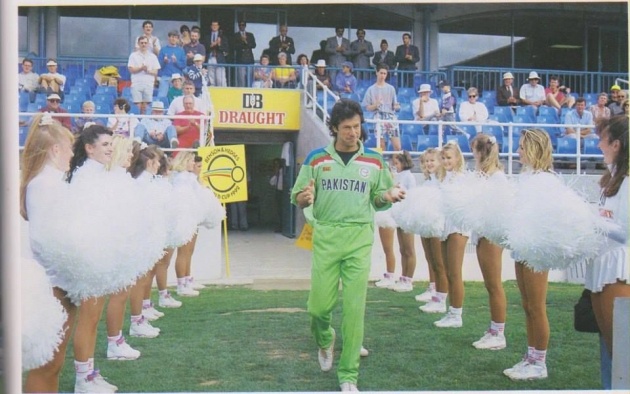 Career
Career
-
He made his test debut in the 1971 English series in Birmingham, but failed to make a mark due to his not-so-good performance.
- In 1974, he debuted in One Day International (ODI) in the Prudential Trophy and was selected in the national team after returning to Pakistan.
- His splendid performance against New Zealand and Australia during 1976-77 added to his rapid success, which made him a prominent fast bowler in Pakistan during the 1980s.
- He was chosen as the captain of Pakistan cricket team in 1982. He performed stupendously as a fast bowler and all-rounder, leading his team to its first Test victory against England, at Lord’s, after 28 years.
- Under his captaincy, Pakistan won 14 out of 48 test matches played, losing out on 8 and 26 resulting in a draw. In the ODI version, he played 139 matches, with 77 wins, 57 losses, and one tie.
- A stress fracture in his shin kept him away from cricket for two years. He returned and gave Pakistan its first ever Test series win against India in 1987, followed by Test series win in England.
- He retired in 1987, but returned in 1988, upon Pakistan President General Zia-ul-Haq’s request. He won a Test series against West Indies and was declared ‘Man of the Series’ for his 23-wicket haul in 3 tests.
- In 1991, he established Shaukat Khanum Memorial Trust, a charity organization associated with research and development of cancer and other related diseases, named after his mother.
- He retired from cricket in 1992, with 3807 runs and 362 wickets in tests and 3709 runs and 182 wickets in ODI.
- He entered politics in 1997 by setting up his own party ‘Pakistan Tehreek-e-Insaf’ (PTI), as an initiative to eradicate mismanagement and corruption in Pakistan.
- He contested in October 2002 elections and was elected as a Member Parliament from Mianwali.
- In 2008, he founded Namal College, an associate college of the University of Bradford and established Imran Khan Foundation.
- During the 2013 election campaign, he started ‘Naya Pakistan Resolution’, after which his party posed a threat to the main opposing Pakistan Muslim League-Nawaz (PML-N).
- He rejected the offer to collaborate with Pakistan Peoples Party (PPP).
He injured his head and back upon tumbling from a stage during a campaign rally, four days prior to elections and continued to vote appeal from the hospital but party lost to PML-N. - His views on cricket have been published in different British and Asian newspapers and Indian publications, including Outlook, Guardian, Independent, and Telegraph.
- He is actively involved with commentary on cricket matches for various sports networks, like Star TV, BBC Urdu, and TEN Sports.
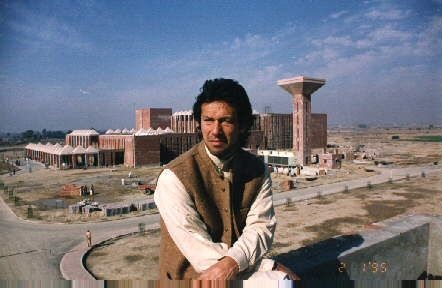 Records & Achievements
Records & Achievements
- He became the hero of Pakistan in 1992 when he accomplished his greatest success winning the first ODI Cricket World Cup for Pakistan, defeating England in the finals, at Melbourne, despite suffering from a ruptured shoulder cartilage.
- This all-rounder’s triple in 75 tests, comprising of 3000 runs and 300 wickets, is said to be the second fastest record behind English player Ian Botham’s 72.
- His world records as a captain include most wickets, best bowling strike rate and best bowling average in test, and best bowling figures (8 wickets for 60 runs).
Awards
- He received ‘The Cricket Society Wetherall Award’ for being the leading all-rounder in English first-class cricket, in 1976 and 1980.
- He was honored with the ‘Sussex Cricket Society Player of the Year’ award in 1985.
- He was awarded the second highest civilian award, Hilal-e-Imtiaz, from the Government of Pakistan.
- In 2004, he received the Lifetime Achievement Award at the Asian Jewels Awards, London, towards his support for various charity programmes.
- He was given the Humanitarian Award at the 2007 Asian Sports Awards, in Kuala Lumpur, for setting up the first cancer hospital in Pakistan.
- He received the special silver jubilee award, along with other cricket legends, at the inaugural Asian Cricket Council (ACC) Awards, in Karachi, in 2009.
- In 2009, he was inducted into the International Cricket Council (ICC) Hall of Fame, as part of its centennial year celebration.
- The Royal College of Physicians of Edinburgh awarded him an honorary fellowship, towards his efforts for cancer treatment in Pakistan, in 2012.
- He was declared ‘Person of the Year 2012’ by Asia Society and listed at #3 in the ‘top nine world leaders’ by GlobalPost.
Personal Life & Legacy
- He married English socialite, Jemima Goldsmith, in a traditional Islamic ceremony in Paris, in May 1995, who converted to Islam before marriage. The couple re-married in a civil ceremony in Richmond, after a month. They have two sons – Sulaiman Isa (1996) and Kasim (1999). The couple ended their nine-year old marriage in June 2004, citing difficulties in adapting to the Pakistani life, by Jemima, as the reason.
- His decision to foray into full-fledged politics struck his marriage, resulting in attacks by his opponents on the pretext of being related to Zionists, since Jemima’s father was a Jewish.
- In 2014, he married British-Pakistani divorcee Reham Khan, a former BBC weather girl, in a secret ceremony at his residence in Islamabad, despite objections from his own family.
Trivia
This cricket legend belongs to a cricketing family, which has produced successful cricketers, like Javed Burki and Majid Khan, both being Oxford pass-outs and captains of Pakistan national team.
All Images By GOOGLE
By Nadeem Ahmad Rustam Distt, Mardan KPK Pakistan

